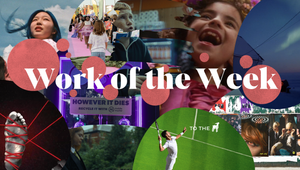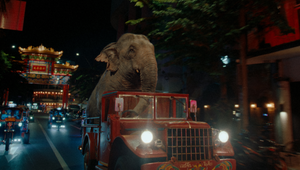
Finely Sliced: Meg Thorne on Being an Integral Part of the Storytelling Process

It was playing The Sims on the computer that taught Meg to use footage and sound to manipulate a multitude of different outcomes. Thus, aged thirteen and living in rural South Wales, Meg realised she wanted to become an editor. She joined The Quarry in 2020, where she’s worked on a whole variety of promos, shorts and commercials – but with a particular penchant for choreography and dance-based projects.
Meg’s recently given birth to baby Max - her proudest achievement. Coming at a close second, however, was watching her Anton Corbjin directed documentary for Depeche Mode be screened in the cinema.
LBB> The first cut is the deepest: how do you like to start an editing project?
Meg> The selecting process is probably my favourite part of editing. Having a day to myself going over the footage again and again and building my selected sequences. I then like to go over those sequences and cut them down even further, this means when it comes to going over the footage with the director, I feel confident that anything in my cutdown selects are the best of the best. Of course the original selects sequence is in my back pocket if something isn’t quite working for us, but it’s a way of knowing in myself that I’ve picked out the best moments. From my cutdown selects I like to start building an assembly straight away, I normally aim to have a rough assembly in place before the director comes and sits with me as I know they’re as keen as I am to see how the whole thing is coming together. I also make sure I have a good selection of music and SFX sourced from day one, along with any graphics, so I’ve covered everything.
LBB> Non-editors often think of editing just in technical terms but it’s integral to the emotion and mood of a film. How did you develop that side of your craft?
Meg> Editing isn’t all about the visuals, it’s about the feeling you get, on when it feels right to cut. I do a lot of work on choreography based projects and you need to feel the movement within what you’re watching for it to really get to your emotions. I’m always looking for that goosebump moment. Sometimes you can be on a shot for half a second, sometimes over ten and I make that judgment over time. I want to feel excited when I watch my edits back and it’s really important that that feeling doesn’t dissolve over time. If it does, something isn’t quite right so I try something else out.
LBB> How important is an understanding of story and the mechanics of story?
Meg> Storytelling is a vital part of editing, it’s the core of what we do. Before I start any project I need to make sure I understand the story or at least the directors understanding of it and we need to work together to make sure it’s portrayed in a way that makes sense. A lot of projects I’ve done have had a more non-linear approach, especially music videos but within that there’s still a story, it’s just said more with emotions than blatant visuals. What I love about editing is how I can manipulate a story by changing one thing, whether it be one visual edit or a sound edit, or perhaps a long pause. From the PPM, to the final shoot, to the edit, a story can change in so many ways. I love how as an editor, you are an integral part of the storytelling process.
LBB> Rhythm and a sense of musicality seem to be intrinsic to good editing (even when it’s a film without actual music) – how do you think about the rhythm side of editing, how do you feel out the beats of a scene or a spot? And do you like to cut to music?
Meg> I don’t like predictive cuts. They anger me a bit… where’s the excitement? Why do you want a viewer to know what’s about to happen before it actually happens? Yes there are moments where cutting musically to a beat is needed but a lot of the time I like to focus more on what we see than what we hear. Music videos are obviously lead from the track from the get go but I like to assemble them with my selects without the track first so I can narratively see how it feels, so sometimes I have a music video edit which goes way beyond the length of the track, then I use the track to help narrow it down. When I work on commercials, music can be the last thing we look into, so I’d say music doesn’t guide the edit at all. What I love is when you get to a stage visually with the narrative that you’re happy with, then it’s time to search for music. I remember being in the office until 4am once having spent hours and hours trying out endless music tracks for an edit until we found ‘the one’. It was such a great feeling and it made it into the final spot.
LBB> Tell us about a recent editing project that involved some interesting creative challenges.
Meg> I worked on a couple of projects with David Wilson recently and one was a music video for Zach Witness which was released earlier this year. The artist is performing in a train carriage and we wanted to find an effect which gave a sense of the train moving. There’s a few effects within Avid which we tried but they weren’t quite hitting the mark so I ended up filming a piece of blu-tack on the wall with my phone whilst moving a bit like I was on a train. I then brought this into Avid and tracked the blu-tack within the stabilise effect, then dropped that onto the clip and it did the job perfectly. I love playing with effects and coming up with new ways to manipulate the footage.
LBB> How important is your relationship with the director and how do you approach difficult conversations when there is a creative difference of opinion?
Meg> So important! I love every director I work with and it’s amazing how different they all are. The main thing for me is to be totally honest with them. There will sometimes be times when there might be creative differences and I’d always voice my opinion as to why I don’t agree with something. The most important thing is to have solid reasoning behind my approach. If I disagree with something I need to show why. If I am honest and speak my opinion frequently I feel it builds a stronger relationship between us and builds a lot of trust. Without that they’d never return.
LBB> What’s harder to cut around – too much material or not enough? (And why?)
Meg> Not enough material is definitely harder to cut around but there’s also been times where there’s too much. Some commercials I’ve cut have had over 20 takes for one shot and they can be so similar it might actually slow down the decision making process. Whereas on the other end of the spectrum, with way fewer takes it’s faster to make that decision. However much or little material is received though there’s always a way to cut it.
LBB> Which commercial projects are you proudest of and why?
Meg> I’ve recently worked on a few projects which I feel really strongly about and I was so proud to be a part of. The first being the LGBT Foundation’s 'Locked Down and Out' directed by Lucrecia Taormina. LGBT abuse more than doubled since the first lockdown and I felt honoured to be involved in a project that was raising awareness of this.
Another project I’ve been super proud of was 'Filter Face' directed by Will & Carly, raising awareness of 'Snapchat Dysmorphia'. Doctors have labelled this new mental health disorder whereby young people are becoming so addicted to their filtered selfies that they’re seeking out plastic surgery to become the idealised, filtered version of themselves. It was a wonderfully choreographed short film and I had so much fun editing it. It’s my favourite edit I’ve worked on to date that I’d say I’m most proud of.
LBB> There are so many different platforms for film content now, and even in advertising something can last anything from a few seconds to a couple of hours. As an editor, are you seeing a change in the kind of projects you’re getting from brands and agencies?
Meg> It’s rare now that I work on any project and they don’t require a 6sec cutdown. I wouldn’t say I’m an avid social media user but when I do use it, I am one to flick through things and I understand the importance of grabbing a viewer’s attention in the first five seconds. It’s interesting seeing the shift in demand for 9x16 edits as well. I find a lot of footage that comes to me has now been shot in a way to allow for this, which 5+ years ago was never really thought of.
LBB> Who are your editing heroes and why? What films or spots epitomise good editing for you?
Meg> Any editor I have had the pleasure of working with or have assisted in the past. It’s not an easy industry to stick to and I have so much respect for any editor who has kept at it. I have learnt so much from them. Some editors who are also at The Quarry I have known since day one in my editing career and I am so grateful for everything they have taught me. They’re my real heroes. I won’t list names though as it’ll only boost their egos…
LBB> How does editing in the commercial world differ from the film world and TV world?
Meg> I love short form editing and how it keeps me on my toes with the limited amount of time you get to complete it. I’ve never been one to just stop and relax, holidays for me always need to be a 'doing thing' or I get bored, so short form editing in the commercial world is so dreamy to me!! I love how I can work on multiple projects in the space of a month, it makes life interesting.
I don’t despise long form though, if I am interested in the project I’ll happily work on it for months on end. I edited a Depeche Mode documentary in 2019 and it was a totally new way of working in comparison to commercials but because I love their music I really enjoyed it. There were so many emotional stories within the documentary too and every time I tweaked the edit and had to watch back the 120 minute long film I never got sick of it! I’d love to have the opportunity to work on another documentary like that one day. Seeing it on the big screen at the cinema was a wonderful experience too!
LBB> Have you noticed any trends or changes in commercial editing over recent years?
Meg> The main change I’ve noticed is the demand for extra versions and cutdowns, along with faster paced edits and more VFX. I guess due to social media it’s now our mission to try and cram as much in as possible to our edits in a short space of time to sell the story/product. I’ve also noticed more demand for effects within edits, especially at the offline stage, so it’s really important to stay on top of the latest abilities of our editing software's as they’re constantly changing.















